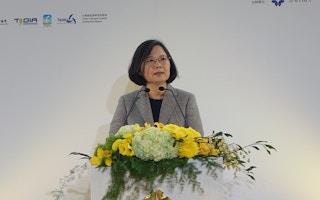The President of Taiwan Tsai Ing-wen said on Wednesday that the shift to renewable energy must pick up pace if the country is to be 20 per cent renewables-powered by 2025—a target set by the government in February this year.
To continue reading, subscribe to Eco‑Business.
There's something for everyone. We offer a range of subscription plans.
- Access our stories and receive our Insights Weekly newsletter with the free EB Member plan.
- Unlock unlimited access to our content and archive with EB Circle.
- Publish your content with EB Premium.
Speaking at the Taiwan International Green Industry Show (TiGiS), Tsai said that the government hoped to double solar capacity on the island by next year—to 1.52 gigawatts. To achieve this, it would be working with the private sector to increase the uptake of solar panels on rooftops in the land-scarce territory, and create a more robust market for Taiwanese renewables firms.
The president told the audience of journalists, industry executives senior government officials that Taiwan’s energy sector is at a “turning point in its transformation,” and stressed the “need for speed” as the country moves to a greener energy mix. Currently, 5 per cent of Taiwan’s energy comes from renewable sources.
The energy target of Tsai’s government—elected in May last year—includes a reduction in coal’s contribution from 45 to 30 per cent of the total energy mix, natural gas’ from 50 to 32 per cent and the complete elimination of nuclear power, which now accounts for 12 per cent of Taiwan’s energy needs.
However, executives at the event, held on Wednesday at the Taipei Nangang Exhibition Center, were skeptical of Tsai’s energy policy—which took a battering in August, when a blackout caused by human error at a state-run gas-fired power plant deprived 6 million households and a portion of the country’s valuable semiconductor industry of electricity for five hours.
“
Is the government pushing their target hard enough? Or is it just a political slogan?
Johnson Chium, account manager, Tainergy Tech Co
Speaking to Eco-Business after Tsai’s speech, Johnson Chiu, an account manager for 10 year-old publicly listed solar manufacturer Tainergy Tech Co, said the government could be doing a lot more to back the renewables sector.
“We’ve had many discussions with the government, but its policies don’t support the industry,” he said, pointing to legislation which stipulates that each rooftop solar installation cannot exceed a capacity of 2 megawatts; it takes a lengthy approval process to get extended.
“We can only install 1.9 megawatts of solar at a time. This is why the roll-out [of solar in Taiwan] has been so slow,” he said. A steady decline in the country’s renewable energy feed-in tariff, introduced in 2009, hasn’t helped either, he added.
“Is the government pushing their target hard enough? Do they really want to focus on renewables? Or is it just a political slogan?” asked Chiu.
Echoing Chiu’s doubts was Betsy Liao, business manager of biomass firm Tsung Chang Industries. Asked if she thought Taiwan could meet its renewables target, she told Eco-Business that it would be “very difficult” and later added that the country would “definitely” take longer than eight years to reach the 20 per cent target.
A lack of regulations and standards for biomass production in Taiwan, and the absence of suitable boilers in power plants to burn biomass pellets had put a curb on the sector, she said.
In September, a report from research group Bloomberg New Energy Finance predicted that Taiwan would raise the share of renewable energy to only 9.5 per cent by 2025, because of the lack of developed supply chains for new forms of energy.
Taiwan’s energy sector was buoyed by the news last week of the merger of the country’s three largest solar firms, Neo Solar Power, Gintech Energy, and Solartech Energy, to form a company with NT$21 billion (US$695 million) in capital.
At a solar energy event in Singapore last month, Assaad Razzouk, chief executive of global clean energy firm Sindicatum Sustainable Resources, said that Taiwan’s renewables target “could be more ambitious” in helping the country meet its Paris Agreement climate commitments.










